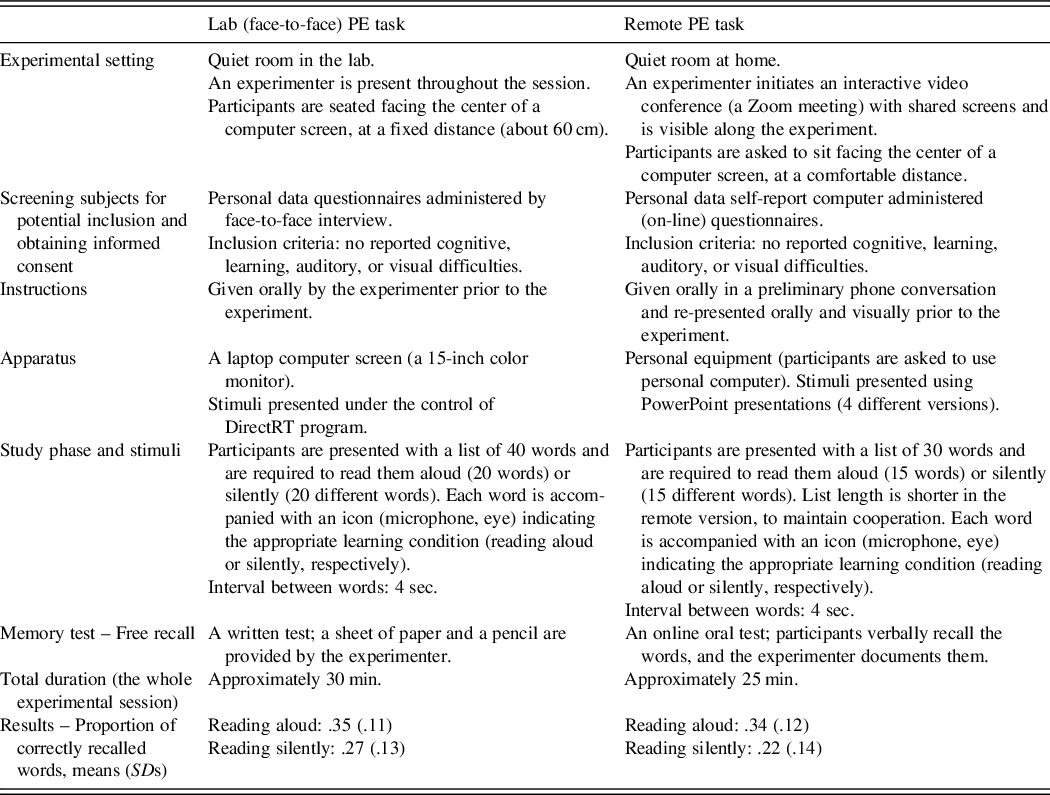Cognitive and neuropsychological assessment typically involves an evaluation of several cognitive domains, such as attention and memory. Focusing on the latter, various tasks are used to test memory functioning. In recent years, the production effect (PE) paradigm has been used to assess long-term verbal memory in different populations (e.g., adults with acquired dysarthria; Icht, Bergerzon-Biton, & Mama, Reference Icht, Bergerzon-Biton and Mama2019). The PE refers to an enhanced memory for items read aloud (vocally produced) relative to items silently read at study.
In this Journal, Mama and Icht (Reference Mama and Icht2019) have recently compared the PE between a sample of adults with ADHD (before and after self-administration of Methylphenidate, MPH) and a control group. Participants learned a list of visually presented words, half by reading aloud and half by reading silently, followed by a free recall test. The results indicated PEs for all groups, with better memory performance for the controls than for the ADHD group. In the ADHD group, recall rates and the PE were higher with than without MPH. These results have both clinical and theoretical implications.
The coronavirus disease 2019 (COVID-19) crisis and the related social isolation measures (“lockdown”) as a response to its spread have reduced the availability of health care services and research. To continue providing necessary services while protecting patients and participants, health systems and other organizations have been encouraged to develop new and better ways to deliver remote services (Wijesooriya, Mishra, Brand, & Rubin, Reference Wijesooriya, Mishra, Brand and Rubin2020). This calls for the adaptation of assessment tools and protocols to telehealth (Phillips et al., Reference Phillips, Chertkow, Pichora-Fuller and Wittich2020).
In response to COVID-19 challenges, we conducted a remote adaptation of the PE paradigm. Designing the remote version, we carefully considered several factors (see, Ben-David et al., Reference Ben-David, Mentzel, Icht, Gilad, Dor, Ben-David and Shakuf2020), as detailed in Table 1.
Table 1. Traditional (face-to-face) vs. remote production effect task: methods and procedures

Sixty healthy participants (mean age: 23.8 years; SD = 1.5 years) were recruited during September 2020. Inclusion criteria are listed in Table 1. Their performance on the remote PE task was compared to a group of 21 participants (mean age: 25 years; SD = 2.7 years) that performed the traditional lab (face-to-face) task, during the months of January–February 2018 (for the full procedure, see Mama & Icht, Reference Mama and Icht2019). Following the study phase, a filler task was conducted, and a free recall test was performed. The results are presented in Table 1, bottom. Statistical analysis (a mixed measures ANOVA, with experimental setting as a between-subject factor, and learning condition as a within-subject factor) revealed a main effect for learning condition, with better recall for aloud than silent words, F(1,79) = 20.27, p < .0001, η p 2 = .20. No main effect was found for experimental setting, F(1,79) = 1.33, p = .25, η p 2 = .02, nor an interaction between these factors, F(1,79) = .92, p = .34, η p 2 = .12.
These results confirm that the remote PE task can be successfully applied to maintain research efforts during the pandemic, extending our understanding on long-term verbal memory abilities of other populations. Further adaptation of experimental and clinical tools is called for to facilitate telehealth-based services.
Conflict of interest
The authors report that they have no conflicts of interests and no financial disclosures.
Ethics approval
This study was approved by the Institutional Ethics Committee, Ariel University.





